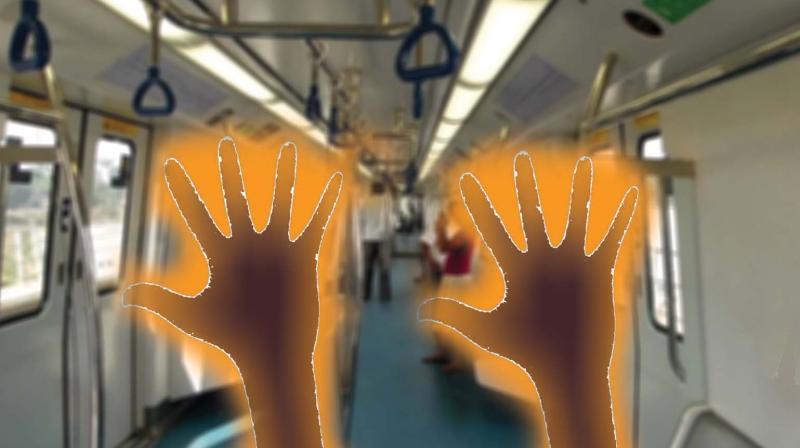Pervs on loose, what has Metro done about it?
BMRCL has appointed law enforcement personnel at stations but this doesn't seem to help, say passengers.

Every urban woman is all too familiar with being groped or rubbed up against on public transport. As Namma Metro expands its reach across the city and more people hop on board every day, life grows harder for women commuters. BMRCL has appointed law enforcement personnel at stations but this doesn't seem to help, say passengers. Reserving seats for women, as is the case with buses, awareness on proper conduct on trains, more security personnel inside coaches and speedy punitive action will go a long way, reports Ranjani Madhavan.
Time was when Namma Metro ran only between Baiyyapanahalli and M.G. Road with few passengers making use of it for this short distance. But now that it is covering more of the city with even an underground section, touching many more stations and localities, its ridership has risen to four lakh a day. While this has made the lives of commuters easier, several women complain they usually have a hard time in the crowded coaches, especially during peak hours with several men pushing themselves against them or indulging in outright groping.
“I travel from Majestic to Baiyappanahalli by Metro everyday and it is always packed. Men take advantage and touch you. If you glare at them or yell, they say 'sorry madam, there is so much rush and no space to stand'. In reality, we know that they are touching us intentionally,” complains Ms Ashika, a PG student from St. Josephs College.
Read | Guest column: 40 per cent of Metro passengers are female, reserve seats
She goes on, “This has happened to me plenty of times. I have seen it happen with other women passengers too and no one comes to our rescue. Younger men are usually very respectful. I always find that the older men, 40 to 50 years in age, are the culprits.”
While Ms Amruthapriya, a daily commuter on the Metro, has herself never been harassed similarly, she says her friends haven’t been as lucky and find the older men doing all the groping and touching. “My colleague was travelling from Srirampura towards Ulsoor one- and- a -half months ago when a man misbehaved with her on the Metro. As she did not want to create a scene, she got down at one of the stations enroute and waited to board the next Metro,” she recounts.
Although personnel of the Karnataka State Industrial Security Force are deputed by the Bengaluru Metro Rail Corporation Ltd. (BMRCL) at the stations for passenger security, this doesn’t seem to be helping a great deal. Most regular commuters say they usually spot only four or five of the KISF guards at any given time at a station.
So should their numbers be increased? Neither Amruthapriya, nor Ashika believe that increasing the number of security guards or placing them onboard the trains will be of any help as the coaches are too crowded for them to apprehend the culprits. “There is absolutely no space to even stand during the peak hours on week- days. Even if a woman tries to complain to the guard on the platform at the next station, the man usually manages to escape and disappear into the crowd,” they note regretfully.
The presence of CCTV cameras in the bogeys too don’t seem to deter the perverts among the men from harassing women passengers as hundreds of people are crowded into them, making it difficult to spot such incidents. Going by the BMRCL, there are 60 to 70 CCTV cameras at each station, besides 40 private security guards providing the passengers security.
Ask BMRCL’s Chief Public Relations Officer, Vasanth Rao, about the women’s complaints and he claims it has not received many of late. “We don't receive too many complaints anymore about men misbehaving with women on our trains. Initially, in 2011 there were some instances after which the police booked cases. Since then such instances have come down drastically," he says.
Better policing, awareness the key
Women will be able to travel in much more comfort by the end of December when the six- coach Metro trains, with a coach reserved for them, are expected to begin running in the city. The longer Metro trains will be rolled out in different sections as and when they are delivered by BEML to the BMRCL.
While welcoming this initiative , transport expert Sanjeev Dyamanavar, points out that Mumbai not only has special ladies coaches on its Metro and local trains, but also exclusive trains for women. “The railways must implement this in Bengaluru too,” he says. Cautioning that this cannot be the end of the Metro’s precautions on behalf of its women passengers, he points out they may have to use the rest of the train too once its coaches increase and there is a resulting surge in passengers.
“BMRCL therefore needs to have a plan with more law enforcement officers in place. It also needs to educate the public on how to behave onboard the Metro. It should spell out the dos and don'ts such as not harming Metro property or other passengers,” he suggests.
Besides installing signages or making announcements at stations on how passengers should behave with senior citizens, women commuters and so on, the BMRCL needs to inform the people what they can do if someone assaults them, whom to contact, and what their rights are, in his view.
So what happens if the women succeed in apprehending their harassers? DCP West, M N Anucheth, says if arrested by the police, the culprits are punished depending on the seriousness of the offence. “Eve teasing can attract a jail term of two years. If there is intentional contact, which outrages a women’s modesty, the jail term can go up to three years,” he explains.

